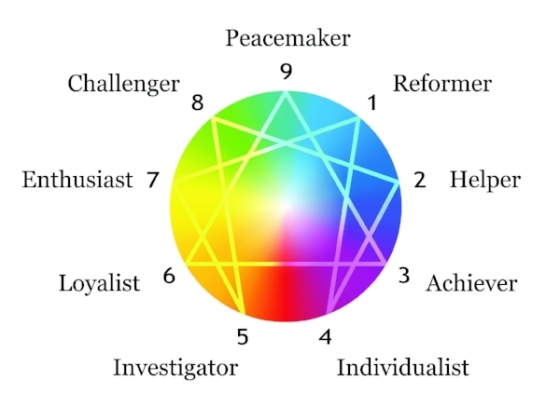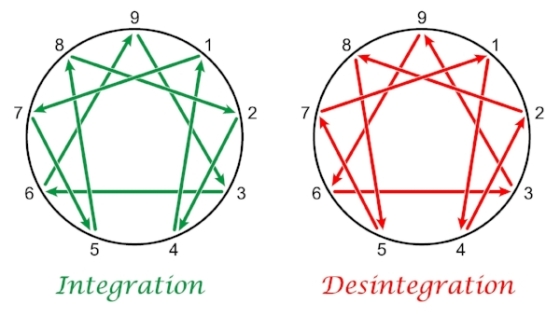Seven years ago I began learning about the Enneagram Personality System. It has changed my life for the better. I am much more compassionate and forgiving of myself. I have a lot more patience and compassion to work with people who experience the world differently from me. I am a healthier and happier person. It has helped me so much I want to share it with others.
This is a story of how the Enneagram the Enneagram personality system works.
Ennea means nine, and gram means figure in Greek. So together it means a nine-pointed figure. What is its history? Here is a short synopsis:

The symbol dates back about 2500 years. The actual date of its beginning or where exactly it started is unknown. It is a coming together of the wisdom of many different spiritual traditions. Much of it has come from Christianity, Buddhism, Islam (especially Sufis) and Judaism.
Much of this spiritual wisdom, was forgotten for hundreds of years. In 1875 Gurdjieff re-discovered the symbol in his search for the knowledge of the esoteric religions of the past. He formed a group called Seekers After Truth. He and his friends traveled through Egypt, Afghanistan, Greece, Persia, and India.
Gurdjieff used the Enneagram as a tool to help his students to find their way in the world through dance and movement.
He explained that the Enneagram has three parts that represent the three central laws that describe divine law which governs all existence.
The circle represents unity, wholeness, and oneness and symbolizes that God is one (Hudson, 1999).
The next symbol is the triangle. In Christianity, this is referring to the Trinity of the Father, Son, and Holy Spirit or in the Enneagram world, the Law of Three. This symbolism found in the Kabbalah, an esoteric teaching of Judaism. The ancient traditions do not see the world as a place of opposites but of non-duality. Hence the world is full of many hues of color rather than black and white (Hudson, 1999).
The third part is the hexad, referring to the Law of Seven. It demonstrates to us that nothing is static. Our world is continuously changing, recycling and evolving or de-evolving. The Periodic Table and the Western musical octave are all based on the Law of Seven (Hudson, 1999).
The modern Enneagram as we know it came to life in California in the 1970’s under Claudio Naranjo. Naranjo and many others since him have woven psychology into the Enneagram to bring it into the modern age. He used panels of each type as one way to teach the Enneagram.
Today the Enneagram teaches that when you are born into the world, your ego chooses one of the nine fundamental ways to survive in the world. These represent the nine Enneagram types. This is how the Enneagram personality system works.
You could not have survived without the ego type your inner self chose. No one knows why we choose the type we do. It is probably a mixture of genetics mixed with early life experiences.
Our personality can begin to get in the way when we become adults if we do not become aware of the limitations of our nature. When you are stuck in your personality, you are only using one-ninth of the tools given.
All the things you do without thinking are your personality speaking. When you begin to be aware of your limited pattern (type) talking, you then become open to responding in new and different ways.
I always say to my clients that when you can notice your personality acting out, you then have the option to respond in ways that are more appropriate for the situation in which you find yourself.
The Enneagram is like a map. It shows you when you are healthy, and not so healthy. It points you in the direction you need to go to get healthier. It warns you when you are getting stuck in old habits that no longer serve you.
When you look at most Enneagram images, you will see arrows pointing in the different directions of integration and stress (disintegration).

The Enneagram is never static. The health of your personality is never static. Each day you go up and down depending on how much stress you are experiencing.
There is movement on the Enneagram as you move to ether your integration point or your stress point.
The integration points you toward the functional aspects of another type when you are dealing with life well. When you are integrating, you are living beyond the trappings of your personality.
There is nothing wrong moving towards the stress type. The stress point is a safety valve. It prevents you from moving down to a lower level of health than you have ever been before.
Just to learn the types can be a fun thing to do. It can be a great party conversation. But it is only of use if you commit to learning through this tool through workshops, reading, reflection, counseling, and coaching.
The only person who can tell you who you are is yourself. For many people, it takes time to discern what type you are. It is easy to misidentify when you are not self-aware.
The Enneagram is no excuse to behave in a particular way. The gift of the Enneagram is that it points out to you the personality box in which you find yourself. A healthy person will develop strengths in all nine types. This is how the Enneagram personality system works.
Learning the Enneagram together with someone that knows you well such as your spouse can be a lot of fun. Your partner can help you to see who you are. When we are so close to ourselves, we can easily deceive ourselves into believing our desired image of our self when in reality people around us experience us differently.
The Enneagram teaching is an excellent tool for any group such as spouses, a whole family, congregation or business to learn how to get along better with each other. You begin to understand your differences because of how you see the world through your different lenses.
I expect at some time in your life you assumed that everyone thought the same as you did—until you got a rude awakening. We all have different ways of seeing and experiencing the world.
You will discover that most people don’t want to annoy you. They just see the world in different ways and have different priorities.
The nine Enneagram types divide into a triad of gut, heart, and head. These are our three energy centers. Your type suggests which one of these energy centers you either avoid or overuse. It just means this is where you are most comfortable but to be healthy, we need to keep all three of these wisdom centers open.
You can also use another triad of assertive, withdrawn and dutiful.
The assertive types of people move out into the world with force and conviction. They are a force to be taken seriously.
The withdrawn types when under stress like to withdraw into themselves to recharge. They are usually great observers of what is going on around them. They are easy to get along with.
The dutiful types when under stress feel responsible for taking care of everyone around them and making sure everyone stays safe. The dutiful types can often feel overly responsible.
The Enneagram is all about finding ways to live with as much presence as possible. Presence is the ability to stay open to the wisdom of your three energy centers: the gut, heart, and head.
The Enneagram is meant to help you move out of the fog of life. When you are stuck in your personality, it is easy to go to sleep to your true self. You live out your image of yourself without any self-awareness. Your life becomes more and more limited unless you find the courage to discover who you indeed are.
Using the Enneagram takes time and intentionality. It is a tool that will give you new things to learn each day no matter how old you are. It is no quick fix.
If someone claims you need fixing with the Enneagram, run away as quickly as you can. These teachers are dangerous!
I love the Enneagram! I hope it can help you as much as it has and continues to help me. I learned that being a type six explained why I had had lots of anxiety issues through my life. I have a lot more compassion for myself. I have learned how important meditation is for me to quiet my mind.
The Enneagram can change the world!
Learning that I am a type six has helped me to acknowledge my strengths such as my ability to look for problems before they become serious.
It has been a blessing in my relationship with my wife, Jen. She is a type five (the investigator). She thinks everything through before she says anything. She finds it difficult to express herself especially when she doesn’t feel that she has enough information.
I am the opposite. I think out loud. I learn through my conversations with others. We have had to learn much. I have learned to give Jen lots of time to think. She has learned that she needs to tell me what she is thinking, especially when it is a decision that affects both of us. We now laugh together instead of cursing each other.

I invite you to try out the Enneagram. It is a productive tool that reflects the complexity and holiness of each person. It shows you where you are right now and where you need to go to get healthier.
This fantastic tool helps you to find your true self or God self. The Enneagram shows you a way to be aware of your sensations that are full of wisdom. The Enneagram shows you a way to remain open to your emotions through your heart. This is how the Enneagram personality works.
You learn that your feelings shine the light on how you are experiencing the world in each moment. Then your mind, when quiet, helps you to connect with your intuition.
Please join me on this journey to new life. May it be full of surprises, wonder, and hope.
Roland Legge offers coaching through REL Consultants for individuals, couples, families, and executives to help them to be the best they can be. For more information, please arrange for a free 30-minute discovery call by phoning Roland at 1 306 620-7478, or you can email Roland at rolandlegge@relconsultants.com
Originally published at http://www.relconsultants.com/blog
Author: Roland Legge
 God is in the in-between. Spirit lives within us and around us. Spirit connects us with all of life both animate and inanimate. To communicate with God, we need to stay present and open to the wisdom that is available to us all the time. You don’t need to go to church to open your channels to higher vibrations.
God is in the in-between. Spirit lives within us and around us. Spirit connects us with all of life both animate and inanimate. To communicate with God, we need to stay present and open to the wisdom that is available to us all the time. You don’t need to go to church to open your channels to higher vibrations.

